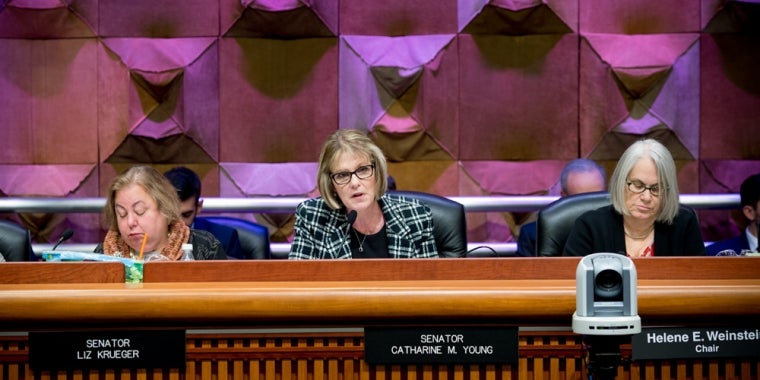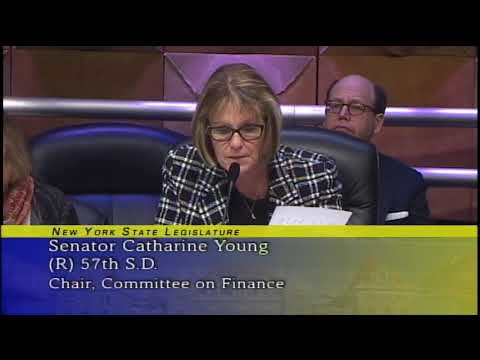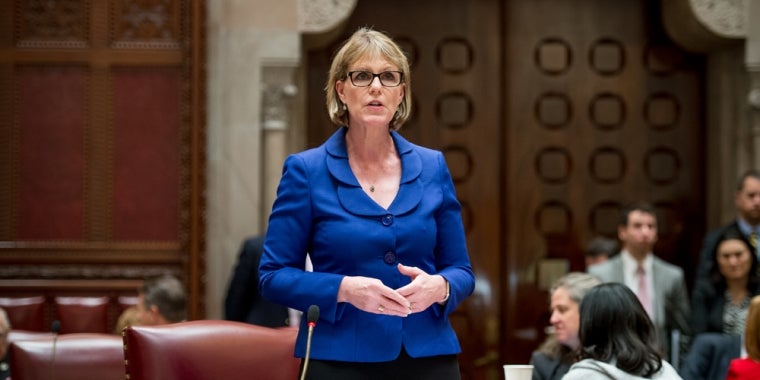
Sen. Young Working to Reduce Taxpayers’ Costs
Catharine Young
October 14, 2011
ALBANY –Saying it would bring immediate taxpayer savings and mandate relief, state Senator Catharine Young (R,C,I-Olean) is calling on Governor Andrew Cuomo to reverse a decision that forces an extra weekly Medicaid payment from counties in 2012.
Counties make a weekly payment to the state Department of Health (DOH) on every Monday to fund its share of Medicaid. In 2012, there will be 53 Mondays, rather than the normal 52, and the state DOH is requesting that the counties submit an extra check.
In Senator Young’s district, the result would cause the 2012 Medicaid cost to county taxpayers to increase by $207,000 in Allegany, $211,000 in Cattaraugus, $600,000 in Chautauqua, and $180,000 in Livingston. Statewide, it would cost local taxpayers millions of dollars.
“This requirement is yet another unfunded mandate, at a time when we are fighting to eliminate unnecessary costs and wasteful spending. Counties need relief from the heavy Medicaid burden, but the state’s decision to require a 2013 payment in the 2012 calendar year makes that burden even heavier. It is a step backward,” Senator Young said.
“Governor Cuomo has done an outstanding job handling fiscal issues, and he can continue his track record by ordering the state agencies to fix this problem now,” she said.
“In 2005, the Senate successfully fought to cap county Medicaid expenses. That cap has provided needed relief to our local taxpayers.”
“That legislation included very specific language that the counties’ cost for Medicaid within any county’s calendar year could not grow by more than three percent annually.”
“It was clearly written within the legislation that the counties’ expense was based solely on a calendar year, not on the number of payment cycles during any calendar year, which can vary between 52 and 53 weekly payments. If DOH attempts to charge counties more than the three percent of what they paid the prior year, the entire goal and intent of our legislation, to cap Medicaid growth costs for local counties at three percent, would be undercut.”
The Senator said she first heard of the early payment requirement from county officials who called her for help. Since then, she has been working to convince the state DOH and Division of Budget (DOB) to reverse the mandate.
The state DOH sent a letter to counties informing them that because the January 1, 2013 legal holiday falls on a Tuesday, the day of the week when they usually remit their weekly Medicaid payments to the state, the local governments would be required to send the money early during the week before in December.
“This bureaucratic glitch hits the counties’ budgets because they have to cover this requirement in 2012 instead of in the 2013 budget where it belongs. All state DOH has to do is move the payment due date to January 2, 2013 so it is booked in the proper year. It is a common sense approach that easily solves the problem,” Senator Young said.
“The state DOH is saying that this situation is a cash flow issue that can be managed by the counties, when that actually isn’t the case. In many cases, county budgets are increasing property taxes to cover the extra payment. Local governments are adding this expense to next year’s bottom line, and it will be passed along to the taxpayers. We need to stop it,” she said.
A quick resolution especially is crucial since counties are preparing their 2012 budgets right now, she said.
“Governor Cuomo worked with us to stop tax hikes, and cut state spending by $10 billion in this year’s on-time state budget. He activated the Medicaid Redesign Team that reduced Medicaid costs by $2.3 billion, and helped establish the Mandate Relief Council to eliminate unnecessary spending. We need his support to change the state DOH’s stance about this issue,” Senator Young said.
“I will continue to push the state agencies and petition Governor Cuomo to fix this problem. The Senate also will carry on our fight to reform Medicaid, welfare and state mandates to reduce taxes and grow the economy,” she said.
#######
Share this Article or Press Release
Newsroom
Go to Newsroom


